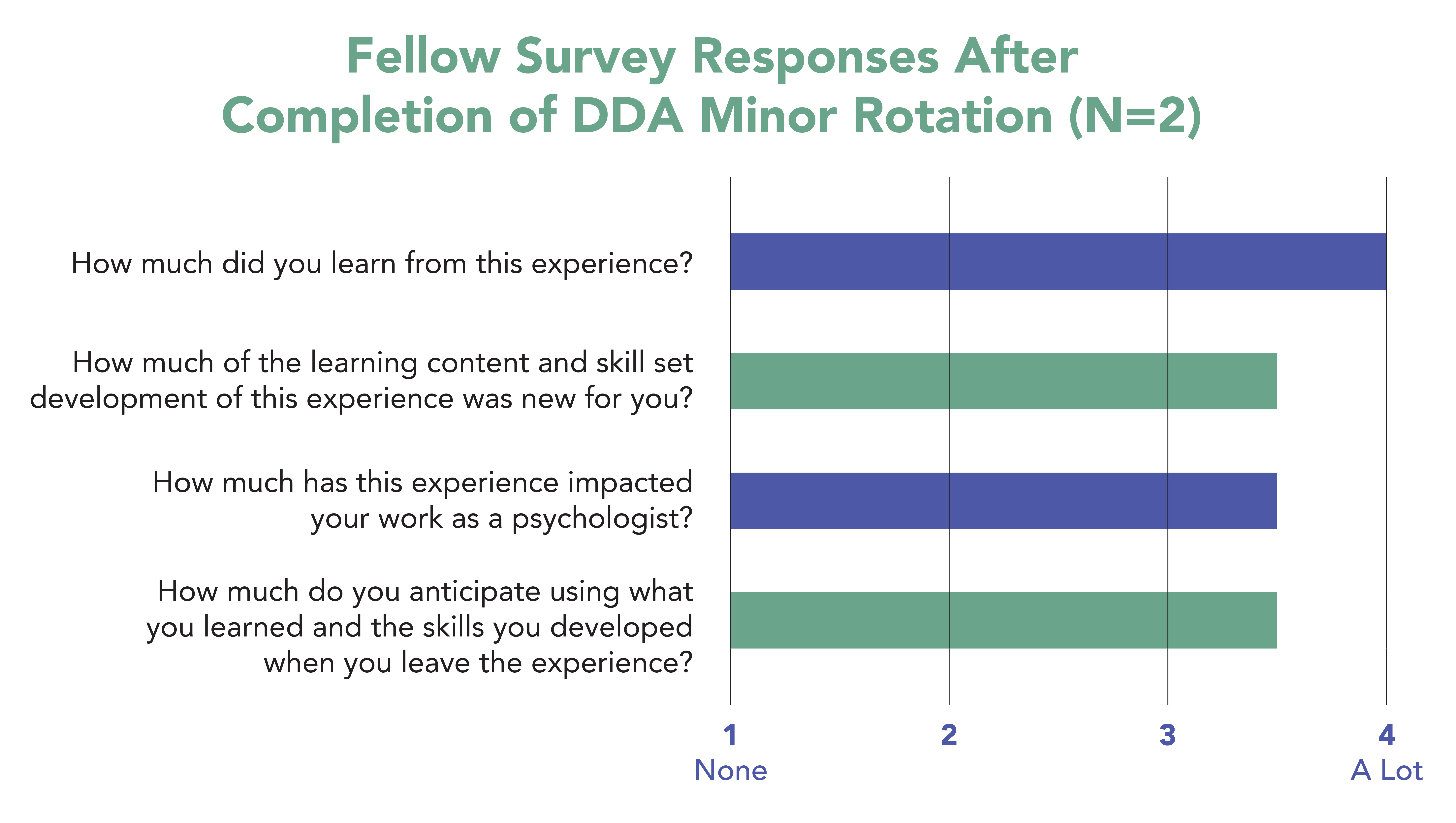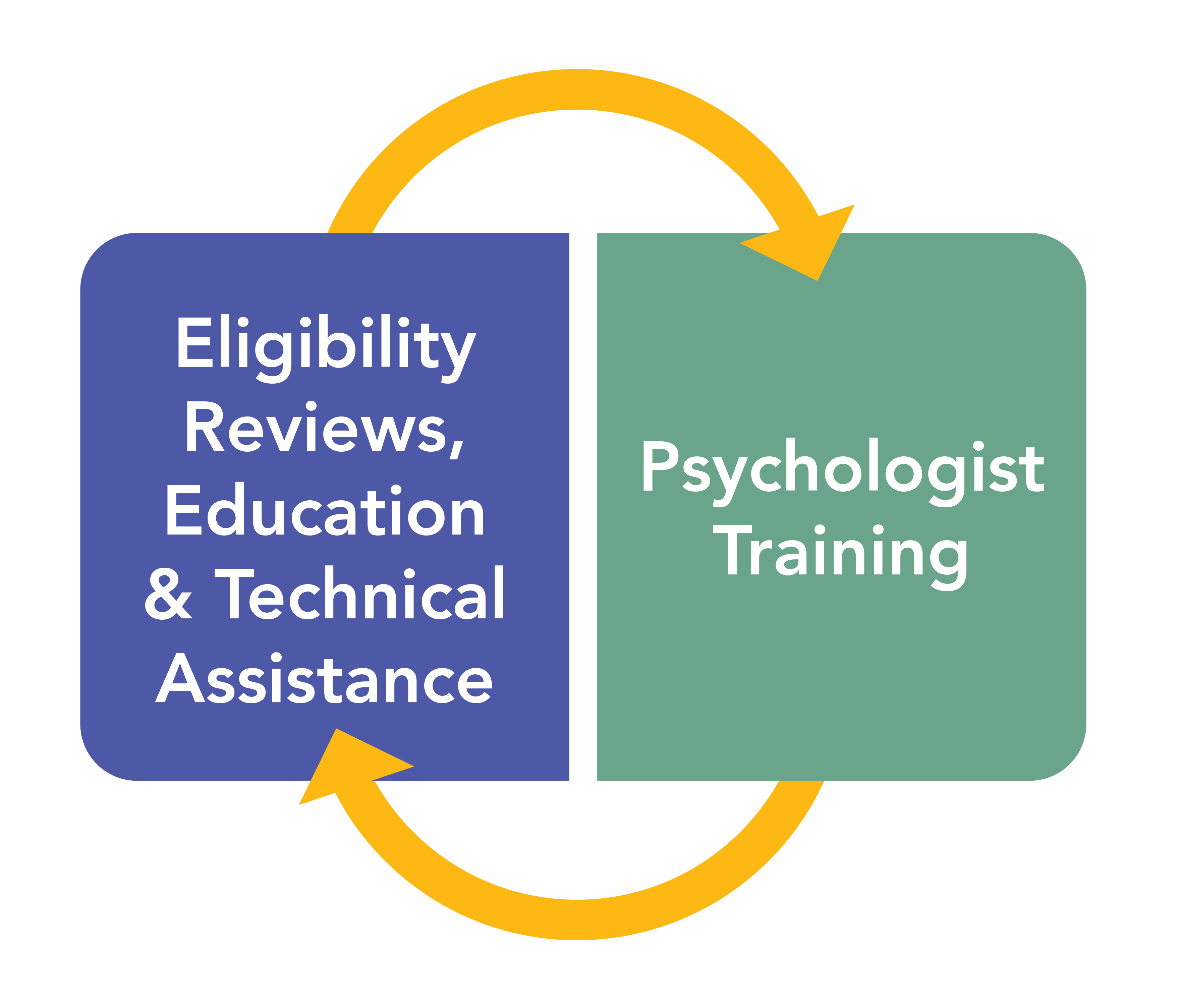Title: A public-private partnership: Fostering collaboration to improve eligibility determination for developmental disability services in Maryland
Authors: Natasha N. Ludwig, PhD; Maureen van Stone, Esq., MS; T. Andrew Zabel, PhD; Elgiz B. Sener, PhD; Meg DePasquale, DSW, LCSW-C
The Challenge
- State developmental disabilities (DD) agencies are tasked with determining who meets eligibility criteria, and the criteria vary among the states.
- This can be particularly challenging in clinically complex cases, and eligibility coordinators may need support from external reviewers to facilitate their decision-making regarding eligibility for these “gray cases.”
- This was the case for the Maryland Developmental Disabilities Administration (DDA), as it submitted 48 gray cases for external consultant review between 2019 and 2021.
- Private and hospital-based (neuro)psychologists who serve individuals applying for DDA support are often unsure of the eligibility review process and how to provide enough information in clinical documents for the review process.
A Solution Through Partnership
In 2019, the Maryland Developmental Disabilities Administration (DDA) sought a public-private partnership with the Maryland Center for Developmental Disabilities (MCDD) at Kennedy Krieger Institute (Maryland’s University Center for Excellence in Developmental Disabilities Education, Research, and Service) to improve the eligibility review process for DDA services and supports for Marylanders.
Maryland DDA and MCDD Partnership Goals
Overarching goal: Build a positive relationship between the state agency and nonprofit organizations (i.e., the DDA and Kennedy Krieger) that support a common group of individuals with disabilities. Specific goals include:

The Model and Outcomes
This public-private partnership introduced (neuro) psychologists to the external review process. It also provided the DDA eligibility coordinators with training and technical assistance in acquired and neurodevelopmental disabilities (NDD).

- "Gray case" review: The external "gray case" review process uses a hybrid model in which Kennedy Krieger (neuro)psychologists, fellows and an attorney with expertise in developmental disabilities review cases on a rotating assignment schedule and then present the cases to the full Kennedy Krieger committee for discussion via a biweekly “rounds” format. The Kennedy Krieger committee then makes an eligibility determination recommendation and provides a written recommendation to the DDA.
- To date, 48 cases have been reviewed, and no cases have gone to a due process hearing.
- Technical assistance: Experts from Kennedy Krieger provide technical assistance to DDA eligibility coordinators on rare clinical diagnoses and disorders, when requested.
- DDA education: Experts from Kennedy Krieger provide stand-alone special topic training for DDA staff (e.g., about high-frequency conditions, foundations in assessment) and periodically attend DDA eligibility coordinator staff meetings to provide in vivo case consultation. Six educational activities occur each year.
- Sample presentation topics include:
- Clinical Aspects of Intellectual and Developmental Disabilities
- ASD: Diagnosis, Comorbidites & Outcomes
- Adaptive Functioning in Individuals With Developmental Disorders
- Childhood Epilepsy
- Co-occurring Developmental and Psychiatric Disorders
- Sample presentation topics include:
- Community psychologist education: As Kennedy Krieger (neuro)psychologists and an attorney became increasingly familiar with the DDA application and eligibility process, they developed internal and external training for psychologists practicing at local and regional hospitals to improve documentation submitted for eligibility applications for individuals with disabilities.
- Sample presentation topics included:
- Presented to the Center for Autism Spectrum Disorders at Children’s National Medical Center:
- DDA Eligibility: Lessons From the Kennedy Krieger Eligibility Review Team
- Presented to the Center for Autism Spectrum Disorders at Children’s National Medical Center:
- Presented to the Kennedy Krieger Department of Neuropsychology:
- Supporting Adults With NDDs and Significant Cognitive Impairments
- Functional Interviewing
- Transition to Adulthood
- Sample presentation topics included:
- Residency education: A training component was developed wherein neuropsychology fellows complete four-to-six month rotations working with the Kennedy Krieger committee to complete case reviews as well as education and technical assistance to the DDA. The two fellows completed an exit evaluation when their rotation concluded. The data collected include:

- “Being a part of the DDA team has definitely helped shape how I approach neuropsychological assessments for patients who would likely be appropriate for DDA services and supports. I’m much more likely to thoroughly document adaptive functioning now, including aspects that aren’t always clearly laid out on questionnaires but make a big difference for eligibility (e.g., safety concerns). It has also shaped how I write certain aspects of my report, as I want to make it as clear as possible to anyone reviewing the application why I recommended they apply and think they would be eligible.” – Fellow
- “It definitely shifted the way I will operate as a clinician, and the way I think about individuals with intellectual disability from an eligibility perspective and how to write my reports in a way that helps make a stronger case for the patients I think are eligible. It has also encouraged me to be more proactive about learning about the rules/regulations surrounding disability services in the state I’m moving to!” – Fellow
Conclusions
- Evaluation of this public-private partnership model suggests a bidirectional learning impact, with improvements reported in the DDA eligibility application process and in the diagnostic documentation submitted by clinicians for DDA eligibility determination.
- Evaluation data from one training series indicated that all of the series’ participants found the presentation relevant to their work, reported that their knowledge increased, and recommended the training series to their colleagues.
- Quarterly meetings between Kennedy Krieger and the DDA leadership are critical to the success of the partnership.
Limitations
- The MCDD has collected only two years’ worth of data.
- The DDA educational training sessions were converted to an online platform due to the pandemic.
- Data were not collected for all training sessions.

